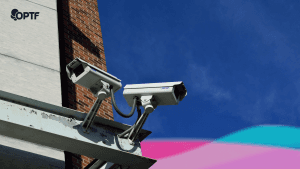Stifling speech: Censorship, centralisation, and sovereignty in the digital world
September 02, 2021 / Data Privacy / By Alex Linton
In the early days, the internet was something of a protected species. People knew how special it was, the potential it had, and knew we needed to install strong protections to make sure it lived up to its potential. We had the freedom to dream about the bright future that would be built on the shoulders of the internet. And it was easy to think of the internet in terms of ideals, because it wasn’t a part of our daily lives — not yet, at least. Now, the internet has taken over modern life, and it didn’t just make it easier to connect with each other, it gave us entirely new ways to connect.
Now, your digital life is real. And your real life is digital.
Every website was a whole new world. Every chat room was its own hangout. Games like Second Life let you (literally) live out an entire alternate life in a digital landscape. At first, it was easy to dismiss things like Second Life as escapism for people who were unsatisfied with their ‘real’ lives, but as time went on it became more and more evident it was an extreme example of what modern life could look like — a combination of real digital.
Games like Second Life show how online life can imitate real life (Image source: rafeejewell on Flickr)
This is the basis for the so-called metaverse. A space where the physical, augmented, and simulated worlds all converge.
Companies in charge: The power and control of Facebook
Tech giants like Facebook have bought into the metaverse concept, and—according to them—their future depends on how they fit into the metaverse. But schemes for a metaverse headed up by tech giants like Facebook should set off alarms the people watching over the freedom of the internet.
The Facebook octopus has already wrapped its tentacles around huge portions of our online lives. It operates platforms like Facebook, Messenger, WhatsApp, Instagram, as well as being a goliath in terms of advertising and infrastructure. If it sat at the help of the metaverse, Facebook, Inc. could swallow up even more of our lives. It’s not shocking for Facebook to take this maximalist approach, the company has thrived as an imperial power in the tech space, invading and overtaking any corner of the internet where it can plant its flag. Now, Facebook’s grip on the internet is so tight that it has won itself a seat at the table alongside world leaders.
But the international power that Facebook has acquired does come with some baggage. They’re stuck in the middle of a fake news epidemic, making them an important political player in virtually every country in the world. Without a consistent or satisfactory way for detecting and deleting misinformation, Facebook has found itself on the right side and the wrong side of fake news flashpoints all over the world. Just as they’ve had freedom-squasing failures like hiding posts criticising Indian Prime Minister Narendra Modi and calling for his resignation, they’ve also been able to successfully delete hundreds of thousands of pieces of misinformation from their website. Of course, there’s still criticism that they act too slowly — the June elections in Ethiopia are just the most recent example of that. 176 fake accounts, pages, and groups promoting Ethiopian Prime Minister Abiy Ahmed were deleted by Facebook, only for him to win the election in a landslide just four days later. And then there is yet another group of people who say Facebook shouldn’t be meddling at all, arguing that it sets a dangerous precedent for a private company to be able to moderate people’s speech.
This ongoing information war makes the concept of a maximalist Facebook metaverse much more worrying. Facebook’s handling of speech and censorship has left a lot to be desired, and having people all over the world depending heavily on a profit-driven American company to uphold their rights is a recipe for disaster. The more aspects of our lives controlled by one company—whether it be Facebook or a different entity—the greater the concern. With that in mind, any effort by companies to un-fragment the control of the internet should be met with scepticism. In reality, those efforts are driven by a desire to make more money, not to limit rights — but we’ve already seen that limiting rights—like privacy and freedom of speech—can be an unhappy side effect of the unwavering corporate pursuit of profits.
(Image source: Mark Zuckerberg F8 2018 Keynote by Anthony Quintano on Flickr)
The network effect dictates that the bigger Facebook gets, the harder it is to fully opt-out of their services. Because of the way the internet has evolved, the Big Five (Amazon, Apple, Google, Facebook, and Microsoft) probably has some information about even the most privacy-conscious, disconnected people in the world. Because the ownership of tech infrastructure is so highly concentrated between just a handful of companies, it’s hard for people to feel a strong sense of control over the data that is collected and stored about them.
Facebook is so big, it has convinced millions of other businesses, apps and websites to also snoop on its behalf. Even when you’re not actively using Facebook. Even when you’re not online. Even, perhaps, if you’ve never had a Facebook account.
– Geoffrey Fowler in The Washington Post
Despite Mark Zuckerberg’s repeated attempts to convince users and regulators that people are ‘in control’ of their data, the reality is that…if you’re using a Facebook product, you’re not. The invisible surveillance systems laying underneath the candied user interfaces of Facebook, WhatsApp, and Instagram are designed to seize control of your data. That sugar-syrup coated experience does a good job of sweetening the bitter pill of mass commercial surveillance, but it doesn’t actually put users in control of their data at all. No matter how many hidden options, toggles, or transparency reports Facebook provides, if you use Facebook services, Facebook controls the data. The same is true for every tech company that participates in data collection and storage, but the Big Five is especially problematic because people just don’t have alternatives. And once your data ends up on the Big Five slip ’n slide, there is no telling where it might end up. That data is (effectively) for sale to the highest bidder(s).
This is why services with federated or decentralised infrastructures are so important. This gives people more choices, more control, and more agency over the way their data is used. At the moment, the gravity of the Big Five takes those choices away.
Countries in charge: Booting out big tech
There have been some efforts to divide the mass of big tech up into smaller parts. Specifically, the Federal Trade Commission’s antitrust lawsuit against Facebook could potentially pave the way for a splitting-up of the tech giant, and it is part of a larger trend towards a commercial-governmental double bind where, while Facebook can—at times—serve as an extraterritorial soft power, the US Government still seeks to stifle its influence within its own borders.
Without meaningful competition, Facebook has been able to provide lower levels of service quality on privacy and data protection than it would have to provide in a competitive market.
– Federal Trade Commission submission against Facebook, Inc.
From nurturing the early days of Silicon Valley to the countless Delaware C corporation tech start-ups, the US has placed itself at the centre of the tech universe. While behemoths like Facebook might start to get a bit concerning, there’s no doubt the US is quite content being the world’s tech nucleus. All that data—being collected not only about Americans, but people all over the world—flows through data servers owned by American companies. This means that people all over the world are at least partly relying on the US to uphold their access to digital services.
Naturally, this is making some other countries around the world a little…uncomfortable. Especially countries that aren’t best friends with the US. It’s understandable that this seems like a threat to the sovereignty of non-US countries, especially in the context of Facebook’s vision for a metaverse.
Returning to Addis Ababa, Ethiopia’s June elections are the perfect example of why this matters to governments around the world. Justified or not, the way Facebook deleted posts and pages could be interpreted as an interference with Ethiopia’s electoral process.
The Information Network Security Agency (INSA) is Ethiopia’s cybersecurity and signals agency, and its director general, Shumete Gizaw, told Reuters that Facebook was actually deleting content which was “disseminating the true reality about Ethiopia”. Shumete went on to say Ethiopia has begun developing its own social media platforms — intended to stifle the influence of social media platforms operated outside of Ethiopia. Shumete explained that the platforms would be developed entirely within Ethiopia, without outside help, and pointed to China’s use of WeChat as an example of countries developing and spreading local technology instead of overseas competitors.
Of course, INSA’s founding purpose was to surveil Ethiopia’s own citizens in a campaign against dissident journalists, academics, politicians, and activists. So far, the countries trying to build up their digital walls tend to be authoritarian-leaning governments trying to dodge international action against them. Countries like India, China, Brasil, Myanmar, and Iran have all taken various steps—from firewalls, to internet shutdowns, to developing local tech capacity—to try and increase their so-called digital sovereignty.
Although the overarching motivations are obviously extremely dubious, it makes sense from the perspectives of security and sovereignty to want that data that’s flowing into the US’ (digital) borders to stay within your own jurisdiction instead. On a state level, increasing use of local technology affords countries more ‘international privacy’, and gives the state more control over the flow of information. However, thus far these ‘local platforms’ are doing nothing to preserve the personal privacy of countries’ citizens. In fact, typically they’re designed with the express purpose of eroding personal privacy, and are effectively surveillance tools used by governments to spy in their own backyard.
You’re in charge: Being the boss of your own data
While it’s clear that countries aren’t going to put up with unmitigated influence from companies like Facebook, alternatives that are developed, owned, and operated by states hoping to surveil their own citizens are going to be chewed up and spat out as well. That’s where projects like Oxen come in. Oxen puts individuals in charge of their own data, and that’s really the only way to ensure their privacy is preserved.
Using decentralised and federated infrastructures can give people the front-end experiences they’re used to, while also giving them much more agency over who controls, stores, and sees their information.
Federated services allow small or local groups to create instances of social media platforms which cater for their specific community. This way, decisions around things like data storage, privacy policies, and metadata handling can be made by each specific community, and members can make their own choice about whether they want to agree and partake, opt-out, or create an entirely different instance with policies that better suit their needs.
Decentralisation—the network infrastructure for all of Oxen’s products—is vital too, albeit in different ways. Decentralised services aren’t entirely owned and operated within one jurisdiction, so they aren’t beholden to the rules, regulations, and ideals of any particular government or entity. This means decentralised services have much stronger protection around things like surveillance — which state-created ‘local’ tech solutions have had so much trouble with thus far. The confidence users gain from using decentralised products will only prove more and more popular, and the enthusiastic adoption of Bitcoin is just the earliest example of this.
These infrastructures give individuals their own kind of digital sovereignty, and gives them the control to make informed, active, and agentive choices about their own online lives. It helps prevent things like private companies needing to make choices about controlling speech in far-away parts of the world and local governments surveilling their own citizens (and people in other countries, too).
Privacy is all about being able to stop-and-start the flow of your personal information. At the moment, the information valve is stuck wide open, but projects like Oxen are giving more people the power to tweak their valve to suit what they’re comfortable with. That is a fundamental value proposition that companies like Facebook can never, ever offer.
Latest blog posts
The OPTF and Session
The OPTF is transferring its responsibilities as steward of the Session project to the newly established Swiss foundation, the Session Technology Foundation.
READ MORE »
October 15, 2024
Cyber laws around the world: Privacy is not the policy
There is no doubt that the European Union’s GDPR has changed the cyber regulation landscape forever. As onlookers from non-EU countries urge their governments and regulators to adopt similar legislation, countries are rapidly adopting their
READ MORE »
December 04, 2022
The long and winding road : Striving for data protection in Indonesia
Juliana Harsianti is an independent researcher and journalist working at the intersection of digital technology and social impact. The long awaited Indonesian Personal Data Protection Bill was approved by the parliament on 20 September 2022.
READ MORE »
November 17, 2022


